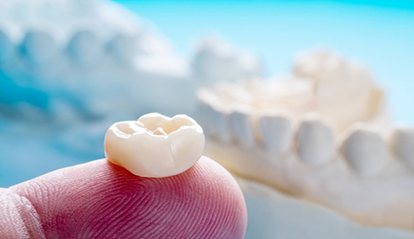
Dental Crowns – St. Albans, VT
Custom-Made Solutions for Decayed & Broken Teeth
For a tooth that is severely broken or decayed, a filling may not be enough to bring back its original structure and function. In this case, a dental crown may be more ideal. This common restorative treatment is personalized to fit your unique smile, repairing your tooth and preserving your oral health. To learn more about how dental crowns in St. Albans can benefit your smile, we invite you to call our team at St. Albans Dental today!
Why Choose St. Albans Dental for Dental Crowns?
- Highly Skilled & Experienced Team of Dentists
- All-Ceramic Restorations Deliver Natural-Looking Results
- Appointments Always Start on Time
What Are Dental Crowns?

A dental crown is a thin, tooth-shaped cap that is designed to cover the entirety of a tooth above the gumline. Once one of our dentists has bonded the crown to your tooth, only a dental professional can remove it. While dental crowns can be made from a variety of materials, including metal alloys, we tend to use tooth-colored ceramic materials for a seamless yet durable appearance.
Who Can Dental Crowns Help?

Depending on your unique oral health situation, your dentist in St. Albans may recommend a dental crown in order to:
- Hold a broken tooth together
- Protect a vulnerable tooth from additional damage
- Shield a tooth that has become weak and worn-down from chronic teeth grinding
- Repair an extremely decayed tooth when it cannot support a filling
- Cover a tooth that has undergone root canal therapy
- Hold a dental bridge
- Restore a single dental implant
- Make aesthetic improvements to an imperfect front tooth
The Dental Crown Procedure

Creating, designing, and placing your dental crown generally takes to visit to our office. The first appointment involves cleaning and reshaping the affected tooth so that it can accommodate the crown. Then, we take impressions of your mouth and place a temporary crown atop the tooth. Between appointments, the crown is crafted to our exact specifications in a separate lab.
When the final crown is ready, which usually takes a couple of weeks, you’ll return to our office to have it placed. After we remove the temporary, we’ll make any last-minute adjustments to your permanent crown as needed. Once you’re happy with the results, we’ll apply a bonding agent to your tooth and cement the crown on top of it.
Caring for Your Dental Crown

With the right care and maintenance, your crown can easily last for 10-20 years. To maximize your crown’s lifespan, make sure to brush and floss every day. Pay special attention to the area at the crown’s base to prevent the buildup of plaque and tartar that could cause tooth decay and gum disease. Also, try not to chew anything particularly hard or sticky with that tooth, since it could damage or loosen the crown. Lastly, visit us for routine checkups and cleanings, and don’t hesitate to call us if you notice a problem with your crown.
Understanding the Cost of Dental Crowns

We know that cost is an important factor in your decision-making, and at St. Albans Dental, we believe in transparency. Our goal is to provide straightforward pricing that reflects the quality care you deserve. Dental crown costs can vary based on several factors, but we want you to feel confident about your treatment plan.
Read more below to see what goes into pricing and how we can help make your treatment more affordable.
Factors that Affect the Cost of Dental Crowns

Several key factors influence the cost of dental crowns. When you arrive for your consultation, we’ll lay out all your options so there are no surprises. Here’s what can affect the total price:
- Material Used: Crowns can be made from many different materials, the most popular being tooth-colored porcelain. Each medium comes with different costs and benefits.
- Tooth Location: Front teeth often require more esthetic detail, while molars need stronger materials, and both have cost considerations.
- Extent of Preparation: If your tooth needs significant work or a buildup before placing the crown, this can impact the cost.
We’ll always provide a clear breakdown before treatment begins and help you find the best fit for your smile and budget.
Does Dental Insurance Cover Dental Crowns?

In many cases, yes! Most dental insurance plans offer at least partial coverage for dental crowns, generally around 50 to 80 percent. Our St. Albans practice proudly accepts Delta Dental, United Concordia, CBA Blue, and many other PPO plans.
If you’re not sure whether your plan is accepted, we can do a quick check for you. We’ll even handle the paperwork to help you maximize your benefits and minimize your out-of-pocket costs.
Other Options for Making Dental Crowns Affordable

Don’t have insurance or need extra help covering the cost? We also accept CareCredit—a third-party financing option that breaks your total cost into manageable monthly payments. With low-interest or even no-interest plans available for qualified applicants, CareCredit can make getting the care you need far more accessible.
We’re committed to helping every patient access high-quality dentistry. If you’re unsure about the cost of dental crowns or how to afford them, contact us today. We’ll help you explore all your options and schedule a consultation to get started on a healthier, happier smile.
Dental Crowns FAQs
Are Dental Crowns Permanent?
While dental crowns are not technically permanent, they are a long-term solution that can keep your teeth safe, beautiful, and functional for up to fifteen years if they receive excellent care. The procedure that prepares a tooth to receive a crown is irreversible since dental enamel does not grow back, so the treated tooth will need to wear a restoration for protection for life afterward. Dental crowns serve to shelter the teeth wearing them from damage and deter destructive infections, which can prevent tooth loss and keep the smile healthy and beautiful for many years. The best ways to keep your crowns in excellent condition are to practice excellent daily oral hygiene, keep up with regular checkups and cleanings at our office in St Albans City, and protect your smile from injury by wearing a nightguard if you grind your teeth in your sleep. We’ll be glad to fit you with a customized nightguard that provides superior protection in our office.
How Long Do Dental Crowns Last?
Dental crowns last for five to fifteen years on average, but the life expectancy of your restoration mostly depends on the material it is made from, where it is placed in your mouth, and how well you care for it. While metal crowns often last longer than metal-free ones, this is not always the case and the difference is sometimes negligible. Crowns placed on molars may not last as long as those placed on the front teeth since they endure more pressure during the chewing process. The best ways to make your restorations last as long as possible include brushing, flossing, and using antibacterial mouthwash every day, seeing us regularly for routine exams and cleanings, and dropping bad oral habits like tobacco use, nail-biting, chewing on ice, and using your teeth to open packages.
How Do You Know When a Dental Crown Needs to Be Replaced?
While the only way to know for sure if your crown needs replacement is to have it examined by one of the dentists at St. Albans Dental, you may notice a few signs that say your crown is ready to be retired on your own. Call us if you notice:
- Pain: If the tooth supporting a crown becomes decayed, the restoration will have to be removed so the infection can be addressed. Afterward, we can determine if the crown can be fixed back on the tooth or needs replacement.
- Instability: Contact us if your crown seems to be moving around on the tooth wearing it, especially if this happens after you eat something sticky.
- Degraded appearance: Crowns are supposed to restore the appearance of teeth as well as their function, so stains or chips can be reason enough to replace a restoration.
- Dark line around the base: A porcelain-fused-to-metal crown may show a dark line along the seam between the tooth and the restoration due to the ceramic section separating from the metal base. This typically means that the crown is nearly worn out and needs replacement.
Do Dental Crowns Get Cavities?
While it’s impossible for dental crowns to get cavities, the teeth wearing them can still suffer from infections. Since crowned teeth are just as likely to be infected as uncrowned teeth, you’ll need to stick to an excellent oral hygiene regimen to keep your restorations and the rest of your smile in great health. A few of the best ways to maintain the beauty and function of your dental crowns are to brush and floss daily, see us for regular exams and cleanings, and limit your consumption of sugary and acidic foods and beverages.